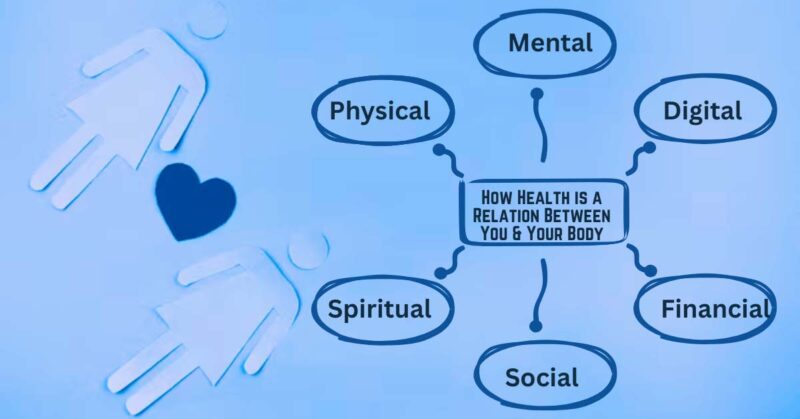Explore how health is related to you and your body. Understand the importance of nurturing this connection through self-care, awareness, and balanced living for overall well-being.
Thank you for reading this post, don't forget to subscribe!How Health is a Relation Between You and Your Body
Health isn’t just a state of being free from illness; it’s a dynamic relationship between you and your body. This relationship encompasses every aspect of your life, influencing how you feel, think, and interact with the world. To truly understand health, we need to look beyond the surface and explore it holistically, considering all six dimensions of health. Let’s dive in and see how physical, mental, emotional, social, spiritual, and environmental health all play a crucial role in our well-being.
Physical Health
When most people think about health, physical health is usually the first thing that comes to mind. Bodily health refers to the proper functioning of our bodies, including the absence of disease and maintaining a healthy lifestyle. This dimension is foundational because when our bodies are well, we can more easily address other areas of health.
Tips for Maintaining Physical Health
- Exercise Regularly: Aim for at least 150 minutes of moderate aerobic activity or 75 minutes of vigorous activity each week.
- Eat a Balanced Diet: Focus on fruits, vegetables, lean proteins, and whole grains.
- Stay Hydrated: Drink plenty of water throughout the day.
- Get Enough Sleep: Adults should aim for 7-9 hours of sleep per night.
- Routine Check-ups: Regular visits to healthcare professionals for preventive care.
Mental Health
Mental health is just as important as physical health. It involves our cognitive functions, including thinking, feeling, and acting. Good mental health allows us to handle stress, relate to others, and make decisions.
The Impact of Stress and Anxiety
Stress and anxiety are common mental health issues that can negatively affect our daily lives. Chronic stress can lead to serious health problems, including heart disease, diabetes, and cognitive disorders.
Techniques for Improving Mental Well-being
- Mindfulness and Meditation: These practices can help reduce stress and improve focus.
- Therapy and Counseling: Speaking with a mental health professional can provide support and strategies for coping.
- Physical Activity: Exercise releases endorphins, which can improve mood.
- Social Connections: Building and maintaining solid relationships can provide emotional support.
Financial Health
Financial health refers to one’s economic situation. It includes aspects such as savings, investments, and managing debt, which all contribute to overall well-being.
The Connection Between Financial and Overall Health
Financial stress can negatively impact physical and mental health. Managing finances effectively can reduce stress and improve quality of life.
Tips for Improving Financial Health
- Budgeting: Create a budget to track income and expenses.
- Savings: Set aside a portion of your income for savings and emergencies.
- Debt Management: Develop a plan to pay off debt systematically.
- Investing: Invest wisely to grow your wealth over time.
- Financial Education: Educate yourself about financial management and planning.
Social Health
Social health revolves around our interactions and relationships with others. It’s about having a network of supportive friends, family, and colleagues.
Building Healthy Relationships
- Communication: Clear and open communication is vital to any healthy relationship.
- Trust and Respect: Building trust and showing respect are fundamental.
- Boundaries: Understand and respect personal boundaries.
- Quality Time: Spend meaningful time with loved ones.
Social Support Networks
A strong social support network can provide emotional support, practical help, and a sense of belonging. We can build these networks through family, friends, online communities, or community groups.
Spiritual Health
Spiritual health involves a sense of purpose and meaning in life. It doesn’t necessarily involve religion, but it can for many people. It’s about feeling connected to something bigger than ourselves.
Connection Between Spirituality and Well-being
Spiritual practices can provide comfort, reduce stress, and promote community. They often involve introspection and the search for meaning, which can contribute to overall well-being.
Practices for Spiritual Growth
- Meditation and Prayer: Regular practices can enhance spiritual well-being.
- Reflection: Spend time thinking about your life’s purpose and values.
- Community Involvement: Engage with groups that share your spiritual beliefs.
- Nature: Spending time in nature can foster a sense of connection and peace.
Digital Health
Digital health refers to the use of technology to improve health and well-being. For example, you can monitor your physical activity with wearable devices or track your mental health with apps.
Impact of Technology on Health
Technology has transformed healthcare, making it more accessible and personalized. Telemedicine, health apps, and wearable devices can help you monitor and manage your health more effectively.
Ways to Enhance Digital Health
- Use Health Apps: Track your diet, exercise, and mental health with various apps.
- Wearable Devices: Use fitness trackers to monitor your activity levels, heart rate, and sleep patterns.
- Telemedicine: Utilize virtual consultations to get medical advice without leaving home.
- Online Resources: Access information and support through reputable health websites and online communities.
Challenges in Maintaining Health
Maintaining health across all dimensions can be challenging due to various factors such as time constraints, a lack of resources, and personal habits.
Common Obstacles
- Time Management: Balancing work, family, and self-care can be difficult.
- Access to Resources: Only some can access healthy food, safe environments, or healthcare.
- Motivation: Staying motivated to maintain healthy habits can be tricky.
Strategies to Overcome These Challenges
- Set Realistic Goals: Break down health goals into manageable steps.
- Seek Support: Find a community or support group to stay motivated.
- Educate Yourself: Knowledge is power; learn ways to improve your health.
- Be Flexible: Adapt your plans as needed, and don’t be too hard on yourself.
The Role of Self-Awareness in Health
Self-awareness is critical to maintaining health. It involves being conscious of your thoughts, emotions, and behaviors and understanding how they affect your well-being.
Importance of Self-Awareness
Self-awareness helps you make better health decisions, recognize when you need help, and understand your strengths and weaknesses.
Techniques to Increase Self-Awareness
- Mindfulness Practices: Regular mindfulness exercises can enhance self-awareness.
- Journaling: Writing about your experiences and feelings can provide insight.
- Feedback: Seek feedback from trusted friends or professionals.
- Self-Reflection: Spend time reflecting on your goals, values, and progress.
Health and Lifestyle Choices
Your lifestyle choices significantly impact your health. From what you eat to managing stress, every choice can improve or harm your health.
Impact of Lifestyle on Health
- Diet and Nutrition: A Poor diet can lead to various health issues like obesity, diabetes, and heart disease.
- Physical Activity: Regular exercise is crucial for physical and mental health.
- Sleep: Adequate rest is essential for body repair and mental clarity.
- Substance Use: Avoiding harmful substances like tobacco and excessive alcohol is necessary for health.
Making Healthier Choices
- Plan Meals: Prepare healthy meals ahead of time to avoid unhealthy options.
- Stay Active: Incorporate physical activity into your daily routine.
- Prioritize Sleep: Create a sleep-friendly environment and stick to a regular sleep schedule.
- Manage Stress: Use stress management techniques to maintain mental and emotional health.
Preventive Health Measures
Prevention is better than a cure. Taking preventive measures can help you avoid health issues before they start.
Importance of Prevention
Preventive health measures, such as vaccinations, screenings, and healthy lifestyle choices, can prevent severe health problems and improve quality of life.
Common Preventive Measures
- Regular Check-ups: Routine health screenings and check-ups can catch issues early.
- Vaccinations: Stay up-to-date with vaccinations to prevent diseases.
- Healthy Habits: Maintain a nutritious diet, exercise regularly, and avoid risky behaviors.
- Hygiene: Practice good hygiene to prevent infections and illnesses.
The Future of Health and Wellness
The health and wellness field continuously evolves, with new trends and technologies emerging to enhance our well-being.
Emerging Trends
- Personalized Medicine: Tailoring healthcare to individual genetic profiles.
- Digital Health: Using technology like apps and wearable devices to monitor and improve health.
- Mental Health Awareness: Increasing focus on mental health and well-being.
Technology’s Role in Health
Technology plays a vital role in health, with advancements in telemedicine, health apps, and wearable devices that track fitness and health metrics.
Conclusion on Health, a relation
Health is more than the absence of disease; it’s a comprehensive relationship between you and your body that encompasses physical, mental, emotional, social, spiritual, and environmental dimensions. Understanding and nurturing each area can help you achieve a balanced, fulfilling, and healthy life. Remember, taking small, consistent steps can significantly improve your overall well-being.
FAQs on Health, a relation
Q. What does it mean to have a healthy relationship with your body?
Having a healthy relationship with your body means accepting, respecting, and caring for it regardless of its shape, size, or appearance. It involves practicing self-compassion, listening to your body’s needs, nourishing it properly, and focusing on its capabilities rather than its flaws. This mindset promotes both physical and mental well-being.
Q. What is health in the human body?
Health in the human body refers to the optimal functioning of all its systems, including physical, mental, and emotional aspects. It involves maintaining a balanced state where the body can resist illness, recover quickly from injury, and sustain energy and vitality. Proper nutrition, regular exercise, sufficient sleep, and stress management contribute to overall health.
Q. How important is health to you?
Health is a critical foundation for well-being and quality of life. When we are healthy, we can perform daily activities with ease, pursue goals, and enjoy life to the fullest. Good health supports longevity and protects against disease, making it essential for achieving personal fulfillment and happiness.
Q. What is the best definition of health?
The best definition of health is not just the absence of illness or infirmity, but total physical, mental, and social well-being. Emphasizing balance and quality of life, this holistic approach acknowledges the interdependence of the body, mind, and environment.
Q. Why is body health important?
Body health is essential because it affects every aspect of life, from energy levels and mental clarity to emotional stability and longevity. A healthy body supports daily functioning, prevents chronic diseases, and boosts the immune system. It also enhances one’s ability to manage stress, improve productivity, and enjoy a fulfilling life.
Q. What is the concept of health?
Health is multifaceted, encompassing physical, mental, and social well-being. It is not just about avoiding illness but about thriving and achieving balance in all aspects of life. Health involves preventive care, healthy habits, and choices that nurture the body and mind for long-term wellness.
Read more articles on Health & Wellness.
You might like to read:



